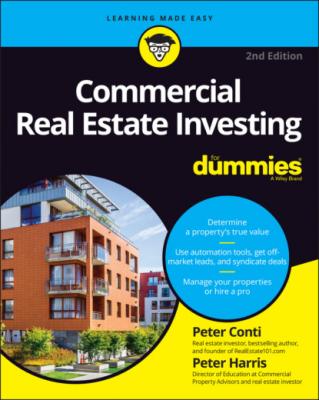ТОП просматриваемых книг сайта:
Commercial Real Estate Investing For Dummies. Peter Harris
Читать онлайн.Название Commercial Real Estate Investing For Dummies
Год выпуска 0
isbn 9781119858515
Автор произведения Peter Harris
Жанр Недвижимость
Издательство John Wiley & Sons Limited
You can invest in a property that’s “ready to go” with no necessary repairs, problems, or other hiccups.
You can invest in properties that have lots of problems and need to be fixed up. Commercial fixer-upper opportunities are in every city. Just like you can do with a residential property, you can fix up, flip, and profit with commercial property.
Big investment returns await you if you take the time to study the fixer-upper how-tos shown in Chapter 15. We like the commercial fixer-uppers because after the rehab is complete, most times you can hold for cash flow, hold for long-term wealth generation, or flip for instant profits that you once thought would take years and years of hard work to earn.
Financing a property
Are there differences between obtaining a loan for a single-family home and a neighborhood shopping center? The answer is yes, of course, but the differences may surprise you. Pretty much all you need to get a home loan is a good credit score and a down payment, and then you have to make enough money to pay the mortgage. When you get a loan for a commercial property, getting a loan is based on the following three main qualifications:
Does the property produce enough income to cover the expenses and mortgage?
What is the condition of the property?
What is the financial strength of the borrower?
Flip to Chapter 8 to discover how to get your lender to say “yes” to your deal, what lenders like and dislike in deals, and tips on choosing the best loan for your deal.
Understanding the Risks of Commercial Real Estate
Is commercial real estate risky? You bet it is. One of our mentors always said, “Anything you go after of great worth has great risk.” Commercial real estate investing involves big dollars and lots of people. And whenever you have lots of money and people working together closely, trouble is right around the corner. But risk is a facet of doing business — any business. You can’t avoid it. The best thing you can do to protect yourself is to understand all the risks that are possible, and then get your advisors involved to help you figure out how to avoid them. Don’t skimp on getting the best advisors you can hire either. As the saying goes, “It’s expensive being cheap.”
But here’s the good news: Risks can be managed to levels of great certainty. Being successful in commercial real estate nearly always means taking calculated risks. Are you willing to risk some of your time and money to be financially free? What if you could secure your family’s financial future? There are risks with everything you do in life. You may have heard of people who spend their whole lives trying to avoid taking any risks, and in the process, they accomplish nothing. What a shame. The point is that sooner or later you’ll probably have to step out of your comfort zone to free yourself from the rat race.
Avoiding lawsuits, the most feared risk
The most feared risk in commercial real estate investing is getting sued. Every tenant you have can be a potential lawsuit. You can also be sued by contractors, city personnel, and the list goes on and on. How do you protect yourself? Here are two lines of defense:
Obtain property liability and hazard insurance.
Choose a protective form of ownership or holding, such as a limited liability company.
Limited liability companies (LLCs) are by far the most popular form of ownership used today to hold commercial real estate.
In Chapter 13, we offer many tips and strategies for holding and protecting your property and assets. Your goal should be to build a “legal fortress” with the right experts.
Risk-proofing your investment plan
In our years of investing and watching numerous successful and not-so-successful investors go at it, we have come up with several fail-safe measures (we call them common-sense measures!) for risk-proofing your investing. Here they are:
Do proper due diligence. Due diligence is the process you go through when verifying the financial documents of the property, performing a physical inspection, and checking out the legal pieces of the property, such as the title. Ninety percent of all deals die during due diligence. So, if you don’t do a thorough job, the consequences can be costly. You may end up buying a property that’s a money pit. However, when done properly, due diligence can actually help you make your sweet deal even sweeter. Reading Chapter 7, which provides the ins and outs of due diligence, may save you millions of dollars.
Don’t overpay. Overpaying is common among new investors. Don’t be the investor in a deal where the agent sets a record price on selling a property! If you’re buying apartments, make sure that you’re aware of what price you’re paying per unit. If you’re buying a shopping center, make sure you know how much you’re paying per square foot. In both cases, see what the recent market closings value your property at. Paying too much will lock up the property’s cash flow for a long time. (See Chapter 3 for more on pricing your prospective properties.)
Have expert market knowledge. Knowing your market like the back of your hand sets you

